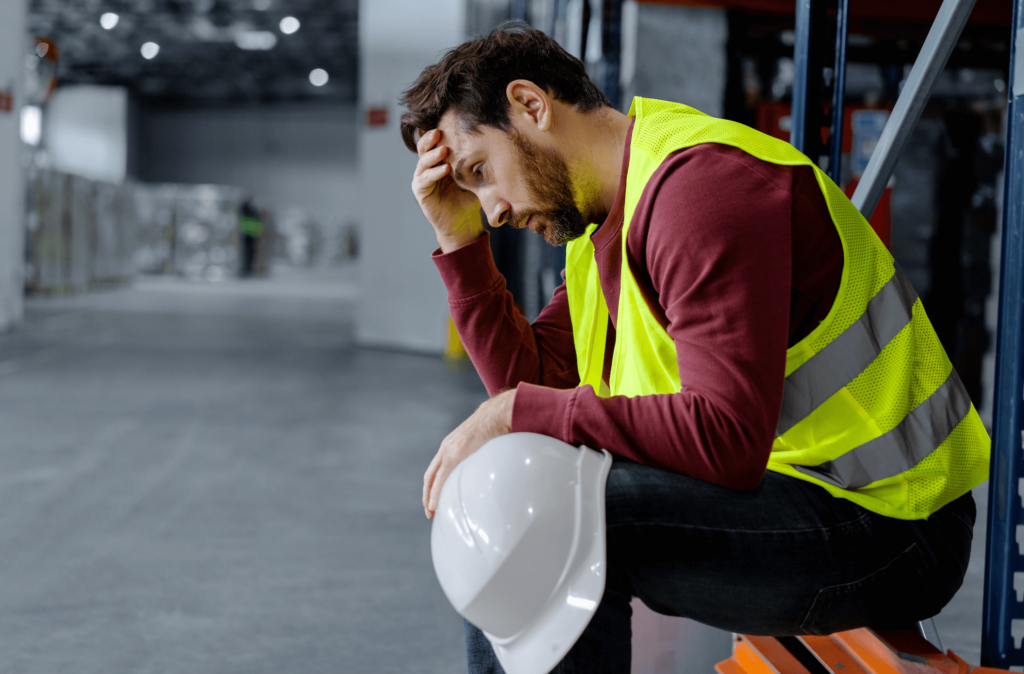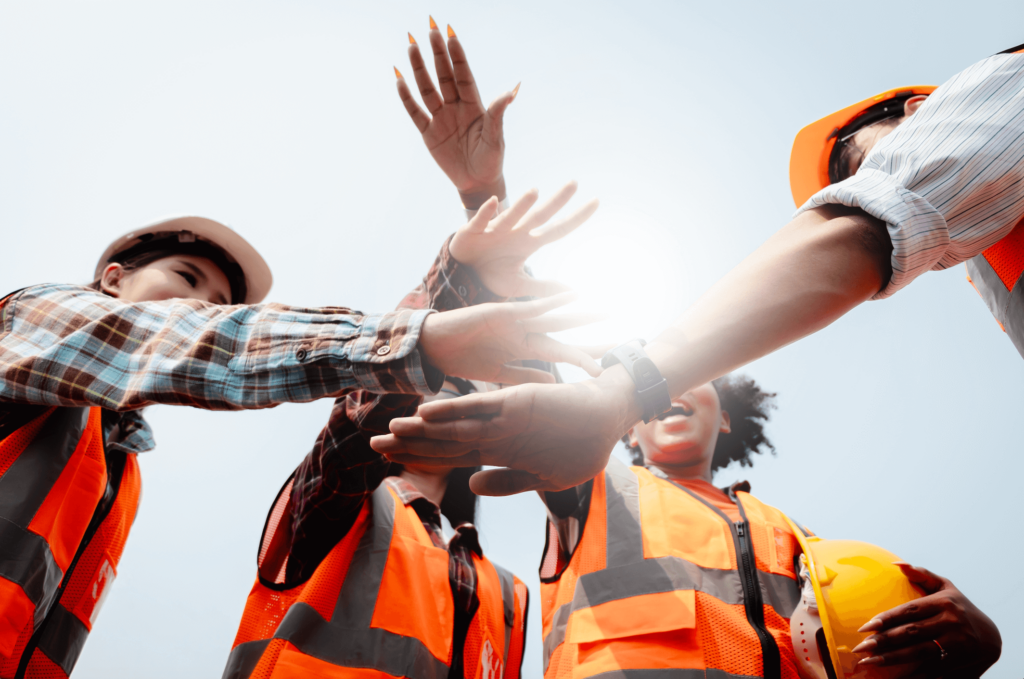There are many reasons to love working in the construction industry, but the long hours, unpredictable employment cycles, harsh working conditions, and physically demanding tasks can take their toll. Compound these conditions with stigma and substance abuse, and you have the perfect recipe for mental health struggles.
Addressing the risk factors for mental health issues will mean implementing structural policy changes, shifting ingrained norms, and having some tough conversations.
Quick look
- The construction industry has the second-highest rate of suicide.
- 78% of workers say they don’t talk about mental health due to stigma.
- Factors contributing to poor mental health in construction include stressful work environments, accidents and injuries, addiction, and stigma around discussing mental health issues.
- Employers can improve mental health by implementing supportive policies, increasing education and awareness, and creating healthy worksites.
- Employees can improve mental health by breaking the stigma, having open conversations, and being open to accessing help when needed.
Mental health risks in construction

In the past few decades, the construction industry has made significant commitments towards protecting the physical health of its workers. In 1910, New York passed the first worker’s compensation law; in 1937, the Golden Gate Bridge construction project was the first to require hard hats; and in 1970, the Occupational Health and Safety Act was passed nationwide.
Protecting mental health in the construction industry, however, has not received the same focus despite the debilitating and sometimes fatal effects of mental health issues like stress, anxiety, and depression.
80% of construction workers say they’ve experienced a mental health issue, and the construction industry currently holds the dubious distinction of having the second-highest suicide rate out of all major industries, second only to mining.
While mental health issues can’t be prevented by wearing a hard hat, they can be reduced significantly by addressing contributing factors to mental health issues in the construction industry.
Stressful work environments
Construction work is physically and mentally demanding. It involves backbreaking labor that often occurs outdoors or in unfinished structures, which means enduring blazing heat in summer and freezing temperatures and conditions in winter.
Projects are often competitive and high-pressure, and require being away from family and friends for long periods of time. The uncertainty of seasonal and cyclical job cycles means you never quite know if you’ll still be working a few months down the road.
All of these conditions are stressors that can easily lead to anxiety and depression and, over time, erode mental health.
Addiction
To deal with long hours, intense physical labor, and pain from injuries, both old and new, many workers turn to drugs and alcohol. According to the National Survey on Drug Use, 15% of American construction workers have a substance use disorder, with over 16% reporting drinking heavily in the past month and over 11% reporting illicit drug use within the past month.
Self-medicating with drugs and alcohol can lead to addiction, shame, and a cycle of highs and lows that can feel impossible to escape from.
Accident and injury
Even with advancements in construction safety, there is still a persistent risk of serious injury from things like falls, heavy machinery accidents, dropped objects, and electrocution.
In 2022, the construction industry reported 169,000 workplace injuries (and this number is likely much higher since 25% of workers say they’ve gotten hurt on the job and not reported it).
Not only is it stressful to work with the risk of injury hanging over your head, but getting hurt on the job can mean time away from work, lost income, reduced mobility, and an increased risk of addiction as a way of dealing with chronic pain. Your mind and your body are intricately connected—when physical health suffers, mental health does, too.
Stigma
With intense cultural pressure to be tough, stoic, and in control, men are much less likely to seek out support for mental health issues—and 90% of the construction industry is male. This means that a construction site is one of the least likely places to hear someone not only admit to having a tough time but reach out and ask for help, too.
A 2021 poll conducted by the American Psychiatry Association reported that just 18% of those in the construction industry said they’d openly discuss mental health with coworkers, and only 17% said they’d open up to supervisors. Over three-quarters of respondents said the reason for their silence was the stigma around talking about mental health.
Feeling like you have to suck it up and grind it out means suffering in silence, but it doesn’t need to be that way.
4 ways to prioritize worker mental health

It’s everyone’s responsibility on a job site to keep each other safe—this includes mental health. Employers and employees must work together to address mental well-being and create a healthy environment where people can share, heal, and recover.
1. Top-down focus on mental health
One of the most effective ways for the construction industry to address mental health is by ensuring that managers, supervisors, and foremen are empowered to support the well-being of their crews.
Without company policies that actively encourage workers to ask for help, employees who are trying to improve their mental well-being can feel like they’re fighting an uphill battle.
How to take action:
- Educate, empower, and equip. Ensure employees are educated about mental health, empowered to advocate for themselves and their coworkers, and equipped with the resources they need to access or offer help when needed.
- Reduce stressors. Implement structural policies for paid time off, adequate breaks, timely communication about future employment, and safe site conditions. Poor mental health is often a result of workplace stressors, and these should be reduced whenever possible.
- Avoid lip service. We all know the feeling of sitting through a meeting where a company extolls the virtues of doing one thing while continuously doing the opposite. Hosting seminars about the importance of mental health without providing the policies or resources to back it up can leave employees feeling frustrated.
2. Offer and access mental health resources
Human beings aren’t meant to go through life alone, and this is true for even the most macho construction worker. You wouldn’t hesitate to ask a coworker to help you move a hefty steel beam—why struggle on your own when life gets too heavy?
If you’re a manager or supervisor, make sure your workers understand when to ask for help and how to do it, and remove as many financial and logistical barriers as you can.
How to take action:
- Educate. Offer up-to-date information regularly about when to ask for help, how to recognize warning signs of poor mental health, and how to offer support to someone who seems to be struggling.
- Provide resources. Provide access to free employee counseling, including sessions that can be conducted virtually or over the phone. It’s much easier to accommodate long hours or changing locations when employees know they can log into a video counseling session or chat on the phone.
- Offer support. Ensure that workers are supported, not penalized, for prioritizing their mental health.
- Make use of what you have. Take advantage of any resources that are offered—they won’t work if you don’t use them! Remember that it may take some time to find the right counselor or treatment for you.
3. Create a healthy work environment
You can’t change many of the most challenging aspects of construction, like the physical demands or the weather, but there are many ways you can ease the mental toll they take on yourself and others.
How to take action:
- Prioritize site safety and advocate for healthy working conditions. Preventing injury and illness means reducing the likelihood that physical health issues will spiral into struggles with mental health.
- Keep it positive. It might sound trite, but cultivating a culture of positivity can have a huge impact on mood and mental health. Notice when things go right, compliment a job well done, and make sure everyone on your job site knows that they matter.
- Promote balance. Encourage a healthy work-life balance with regular breaks, time off to recharge between projects, and room for hobbies, friends, and a life outside of work.
4. Read between the lines
If your strategy for addressing mental health issues starts with an employee or coworker coming to you and saying, “I’m struggling with my mental health,” you might be waiting a while.
Creating open, effective communication about mental health in construction requires raising awareness and offering resources, but it also requires a little reading between the lines.
In an industry so dominated by strict cultural and gender norms, you’ll be better equipped to support mental health if you get to know your crew and coworkers, notice changes in their mood or behavior, and listen to what may be going unsaid.
How to take action:
- Know what to look for. Understand what the symptoms of poor mental health can look like, including apathy, increased conflict, absenteeism, irritability, withdrawal, and changes in sleep, appetite, or mood.
- Stay tuned in. Check in with coworkers regularly and notice how they’re doing. Someone might not come right out and say, “I’m feeling depressed,” but if they seem withdrawn, negative, low-energy, or simply not like their regular selves, it may be time to offer support.
- Lead by example. Whether you’re the site manager or the lowest person on the totem pole, being open about your mental health struggles and successes can inspire others to do the same. This advice can be particularly important for those in leadership—when your workers see you taking mental health seriously, they’ll feel more comfortable doing so, too.
Building mental health together
By working together, the construction industry has erected towering skyscrapers, created gravity-defying bridges, built sturdy homes for millions, and rebuilt entire cities after natural disasters. By harnessing that same tenacity, we can tackle mental health issues head-on.



1 comment